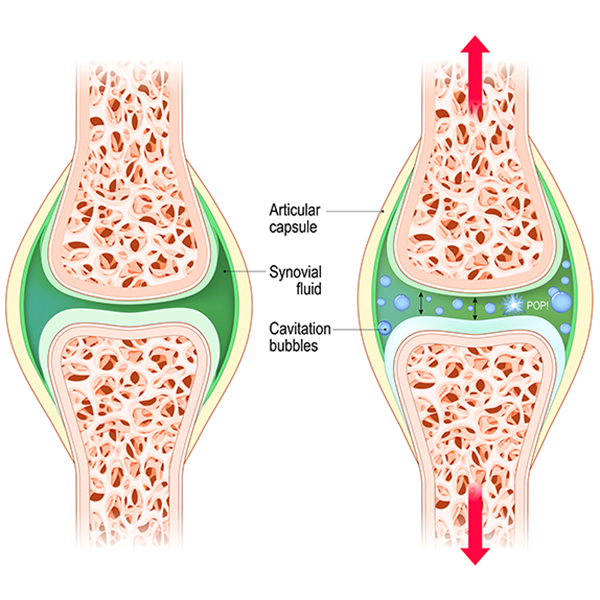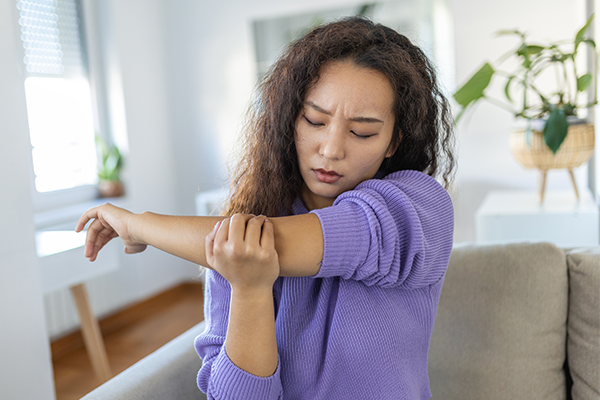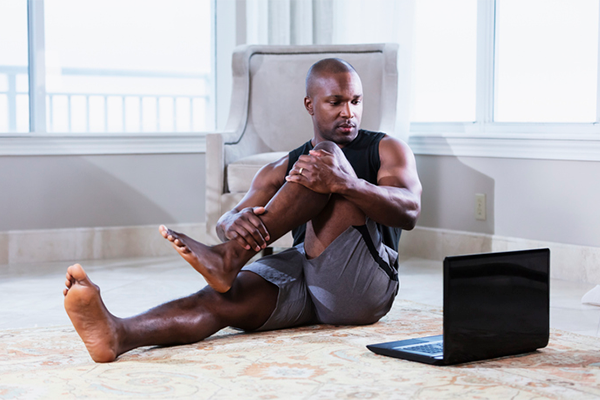4 Reasons Why Your Joints Crack and How to Prevent It

If any type of movement — lifting weights, flowing through a vinyasa, or simply getting up from the couch — is often accompanied by popping and snapping, you might wonder “Why do my joints crack all the time?”
Cracking joints can be alarming, but they’re not necessarily a cause for concern. To help you understand the reasons for those crackles and pops (and when to seek an expert’s opinion), we spoke with a couple of physical therapists who regularly field questions about them.
Why Do My Joints Crack All the Time?
There are four common reasons for cracking joints: air and gas in your joints, friction between tissues, injury, and (in extreme cases) osteoarthritis.
1. Air and gas exchange

“In general, all joints pop from time to time, and it’s largely due to changes in pressure within the joint,” says Maggie Mills PT, DPT. While it might sound like a bubble is bursting, research shows that the cracking sound is usually caused by the formation of a cavity during movement, aka cavitation, which is typically harmless.
However, if your joints are suddenly cracking more than usual, it may be related to your physical activity (or lack thereof).
“A sudden onset of repetitive popping at a joint could just be related to a change in fluid dynamics at the joint, causing variations in air and gas exchange between the two surfaces,” says Amy Graber PT, DPT. “Sometimes this can occur after prolonged positioning in one joint position, like sitting with your knees bent for an extended duration. Or after a period of repetitive use of the joint — maybe after a high-intensity workout.”
2. Friction
Garber says that the sound of cracking joints may also be caused by “subtle variations in cartilage, ligaments, and tendons that may create some friction as they encounter adjoining surfaces or tissue in the body.”
Unless it’s accompanied by pain or swelling, this type of friction between the body’s tissues is not a cause for concern.
3. Injury

Uncomfortable popping or cracking could be a sign of injury.
“For example, if a football player is running and suddenly changes direction, hears a pop, and feels an acute onset of pain, it is possible that the individual has suffered damage to some type of soft tissue including ligaments, tendons, or muscle belly,” Garber says. This type of injury warrants immediate medical attention.
The same goes for any other painful cracking, popping, or feelings of “catching” or “snapping,” even if they aren’t associated with a specific physical event.
“In a PT evaluation, there are a few conditions we will try to rule out in an evaluation if the patient presents with pain and report of joint popping: labral tears at the hip, labral tear at the shoulder, or any type of instability at a joint that is causing subluxation [a partial dislocation],” Garber says.
4. Osteoarthritis
Cracking, popping, or crunching noises, also referred to as crepitus, may be an early sign of osteoarthritis, a chronic condition that causes cartilage deterioration.
“But again, the presence of pain should be the driver to get further evaluation. We all have some forms of defects in our cartilage, especially as we age. But popping on its own isn’t a cause to look further at that,” Garber says.
When Should You Be Concerned About Cracking Joints?
On its own, a cracking joint doesn’t require medical attention.
“Pain is really the red flag that should warrant further evaluation,” Garber says. “If popping exists in the presence of pain, we start to look more closely at the passive structures in or around the joint — the cartilage, ligaments, soft tissue, fascia (connective tissue) — to rule out any problems with those structures.”
Can You Prevent or Treat Cracking Joints?
Even if your joints crack all the time, there’s probably no real need to treat them.
“Non-painful popping really isn’t something that is modified well in the body,” Garber reiterates. “It’s a normal occurrence within the body.” However, if you’re interested in bolstering your overall joint health, there are a few things you can try.
1. Mobility work and strength training

“Training the body to have improved biomechanics with repetitive movements may result in reduced abnormal movement at the joint, which could be a cause of popping, though rarely,” Garber says. “A PT can prescribe exercises to strengthen the muscles around the joint to create greater dynamic stability for the joint and reduce the potential for cartilage injuries that may contribute to popping.”
And even if they don’t reduce joint cracking, stretching, foam rolling, and resistance training have myriad other health benefits.
2. Hydration
As if you needed another reason to drink more water. “Hydration is key for all joint health!” Garber says. “It doesn’t necessarily impact non-painful popping, but painful popping caused by cartilage defects may be related to friction between two cartilaginous joint surfaces. In this sense, making sure you are well hydrated allows your cartilage to stay sponge-like and healthy and reduces friction between the joint surfaces that may lead to pain or painful popping.”
